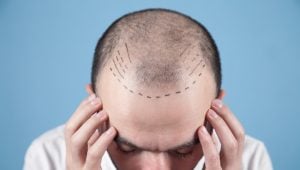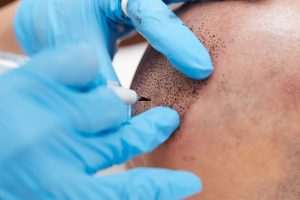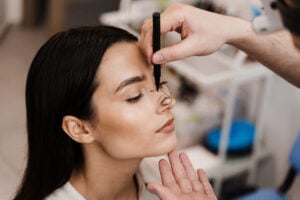Women have long considered their hair to be their crowning glory, and female hair loss can have a devastating effect on their self-confidence and quality of life. Hair loss in men is much more acceptable and often considered sexy, not so for females, who also show different hair loss patterns. In women, hair loss usually starts at menopause when oestrogen levels drop but can be related to pregnancy, stress, illness, or hair treatments.
Hair transplants have been performed for a long time; however, today ninety percent of hair transplant surgeons use a surgical method called FUE (follicular unit extraction) or FUT (follicular unit transplantation), which was introduced in the nineties. Medications are still the most common form of hair loss treatment in women and may include Minoxidil (or Rogaine), iron supplements, and anti-androgens. It is essential that you choose your treatment provider carefully and ask the right questions.
Understanding the Cause of Your Hair Loss
Andrew Cooper, MD of Elite Hair Restoration Surgery, with clinics all over the UK, says, “there is a huge difference in dealing with hair loss in men compared with women. There are a number of conditions that result in the same diffuse pattern, in which the hair over the top and crown of the head becomes thinner and every so often, the temples can also recede, similar to male hairlines. As a hair surgery provider, we often require some more comprehensive investigations to understand and diagnose the hair loss’s true cause before deciding if a hair transplant is even a viable option for the patient.”
According to Prof. Dr. Fuat Yuksel from Longevita in London, there are a number of reasons for female hair loss. “From a lack of vitamins to excessive use of chemically tainted beauty products, hair loss in women is becoming an increasingly common concern. Some of the causes of female hair loss include iron deficiency, low levels of vitamin B12 and excessive heat. Treating female hair loss requires an experienced provider to recognize the needs and expectations of female patients. The treatment may be surgical or non-surgical.”
Matthew Parker, a Patient Coordinator at Surgery Group, explains that there “is a myriad of reasons for female hair loss and the causes are still not fully understood. Female hair loss can be caused by a variety of factors. Below is a list of blood tests that you can request from your GP which may help to diagnose the underlying reasons for your hair loss to help you to manage it better going forward:
- Full blood count
- ESR
- Liver function & lipids
- Vitamin B12
- Serum iron
- Total iron-binding capacity
- Serum ferritin
- Red cell folic acid
- Serum zinc
- Prolactin
- TSH
- Free T4
- Oestradiol
- IgE
- Random blood sugar
Discover Health Tourism Worldwide
The Consultation
Prof. Dr. Fuat Yuksel explains that “During the consultation, the cause for hair loss should be diagnosed and a proper treatment plan should be provided accordingly.”
Andrew Cooper from Elite Hair Restoration Surgery, runs us through the ideal process: “After a Consultation with our in-house hair-loss specialist, we would explore if the patient is taking any medications and give a detailed medical questionnaire. We would then request blood tests. These would consist of things like a full blood count, glucose, serum ferritin (iron stores), thyroid hormones and, where appropriate, gestational hormone levels. If there are any issues with the scalp, we may also make a referral to a dermatologist, who may suggest the patient has a biopsy.
Most importantly, says Andrew, if “these questions aren’t asked, if the process seems too simple and easy to be approved for surgery, then the potential outcome could well be compromised.”
Hair Transplant
If the patient’s solution for hair loss is a hair transplant, according to Longevita’s Prof. Dr. Fuat Yuksel, “the second step is choosing the suitable hair transplant technique. Most of the women prefer an unshaven hair transplant to feel comfortable in their aftercare process. Thanks to this unshaven hair transplant, female patients easily recover from surgery and get back to their daily activities.
With a focused understanding of all hair types and characteristics, including afro hair, the providers must take a bespoke approach for each patient to ensure that they achieve their desired results as quickly and efficiently as possible. It is also important to check before/after pictures of the surgeon’s previous patients to have an idea of the quality of work. If there is an opportunity to read the clinic’s social media reviews and Google recommendations, it may also help female patients feel comfortable choosing the right clinic.”
“Unlike most male patients, female patients do not have a permanent zone from which we can harvest hair for transplantation, so the majority of female hair transplant patients will have the FUT or strip method, which does not require shaving of the donor region,” says Matthew Parker. “For FUE extraction, it is necessary to shave the back of your head. Therefore, the first thing is to ensure that your doctor is, in fact, a member of the Royal College of Surgeons and able to perform such procedures.”
If you are a female suffering from hair loss, do your research before agreeing to hair transplant surgery. There are a limited pool of surgeons specialising in female hair transplants in the UK, but they are well known and have good reputations. There are further options available if you are willing to catch a flight to a medical tourism destination such as Turkey or wider Europe.
However, the starting point for most patients is obtaining non-surgical treatment from a reputable hair-loss treatment centre, who will most likely provide a referral to a known specialist surgeon if you are a good candidate for female hair transplant surgery.















